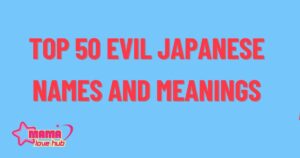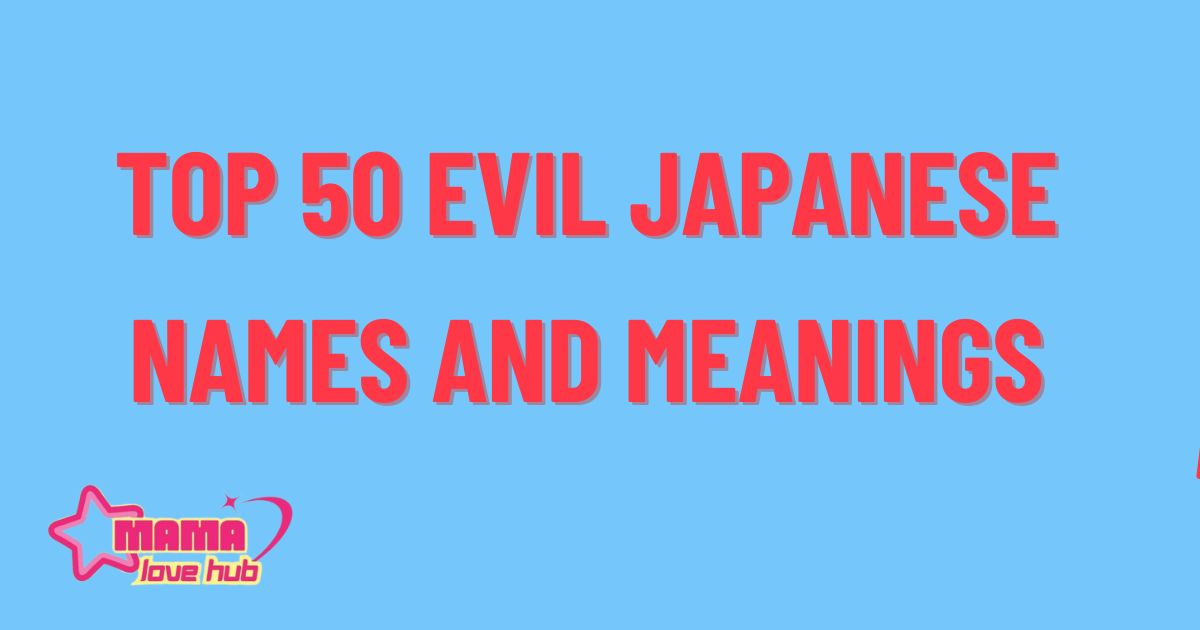Top 50 evil japanese names and meanings
Introduction
Japanese culture, with its rich history and deep-rooted traditions, has always fascinated the world. Among its many intriguing aspects, the significance of names stands out prominently. Names in Japan are more than just identifiers; they carry profound meanings and cultural connotations. Within this realm, the concept of “evil” names piques particular interest. These names, often shrouded in mystery and darkness, reflect a unique aspect of Japanese mythology and folklore. Let’s delve into the world of evil Japanese names and their meanings, uncovering the stories behind these ominous monikers.

Understanding Japanese Names
Structure of Japanese Names
Japanese names usually consist of a given name followed by a family name, or surname. The family name comes first, reflecting the importance of family and lineage in Japanese culture. Given names are chosen with great care, often incorporating kanji characters that convey specific meanings.
The Significance of Kanji in Names
Kanji, the logographic characters used in the Japanese writing system, play a crucial role in names. Each kanji character carries its own meaning and can be combined to form names with intricate and layered meanings. The choice of kanji is essential in determining the connotation of a name.
Cultural Connotations of Names
In Japan, names are not just labels; they embody cultural, familial, and personal significance. The meanings behind the kanji used in names can influence how a person is perceived and even their destiny, according to traditional beliefs.
The Concept of “Evil” in Japanese Culture
Historical Context of Evil in Japan
The concept of evil in Japan has deep historical roots. From ancient times, Japanese folklore has been rich with tales of malevolent spirits, demons, and gods. These stories often served to explain natural phenomena and convey moral lessons.
Evil in Japanese Mythology and Folklore
Japanese mythology features a pantheon of deities and spirits, many of which embody evil traits. From the vengeful spirits known as “onryō” to the malevolent demons called “oni,” these entities play significant roles in Japanese tales.
Modern Interpretations of Evil
In contemporary Japan, the notion of evil has evolved, influenced by modern media and societal changes. While traditional beliefs still hold sway, modern interpretations of evil can be seen in anime, manga, and literature, often reflecting more complex and nuanced views.
Why Choose an “Evil” Name?
The Allure of Darkness
The fascination with evil names often stems from their mysterious and dark allure. Such names evoke a sense of intrigue and power, appealing to those who seek to convey a strong and enigmatic persona.
Cultural Impact on Media and Entertainment
Japanese media, particularly anime and manga, frequently features characters with names that have sinister meanings. These names add depth to characters and enhance the storytelling by aligning with their roles and personalities.
Personal and Artistic Expressions
For some, choosing an evil name is a form of personal or artistic expression. It can reflect an individual’s affinity for darker themes or their desire to stand out with a unique and meaningful name.
Top 50 Evil Japanese Names and Their Meanings
Let’s explore 50 intriguing evil Japanese names and their meanings. These names are categorized into masculine, feminine, and gender-neutral names, offering a comprehensive view of the diverse options available.

Malevolent Masculine Names
Akuma (悪魔) – Demon
Yami (헇) – Shadows
Aku (悩) – Malevolent
Goku (獄) – Prison
Kage (影) – Shadow
Orochi (大蛇) – Large serpent
Kuro (黒) – Black
Kurayami (暗闇) – Dark place
Roku (六) – Six (often associated with bad luck)
Jigoku (在獄) – Hell
Sinister Feminine Names
Yurei (幽阊) – Spirit
Kurai (暗い) – Dark
Majo (魔女) – Witch
Ayakashi (妖) – Specter
Kuroyuri – Black lily (黒百合)
Saku (鎖苦) – Chain and suffering
Kiku (菊) – Chrysanthemum (symbol of death in some contexts)
Rika (理火) – Reason and fire
Shura (修羅) – Fighting demon
Mikage (御影) – Divine spiri
Gender-Neutral Evil Names
Monster – Kaibutsu (怪物)
Akui (悪意) – Malice
Guren (紅蓮) – Crimson lotus
Naku (憣く): To weep
Rin (凙): Chilly
Sen (千) – Thousand (associated with spirits)
Zankoku (洋慷) – Inhumanity
Names Inspired by Mythology
Names from JapanMythologyese
Amaterasu (天照) – Sun goddess
Izanami (伊弉冉) – Goddess of creation and death
Raijin, the god of thunder (雷神)
Fujin (風神) – Wind god
Yamata no Orochi (八岐大蛇) – Eight-headed serpent
Tengu (天狗) – Supernatural bird creature
Oni (鬼) – Demon
Yuki-onna (雪女) – Snow woman
Names from Modern Media
Names from Anime, Manga, and Movies
Light Yagami (夜神月) – Protagonist from “Death Note”
Itachi Uchiha (うちはイタチ) – Character from “Naruto”
Sebastian Michaelis (セバスチャン・ミカエリス) – Butler demon from “Black Butler”
Medusa Gorgon (メデューサ・ゴルゴン) – Character from “Soul Eater”
Griffith (グリフィス) – Antagonist from “Berserk”
Muzan Kibutsuji (鬼舞辻無惨) – Antagonist from “Demon Slayer”
Naraku (奈落) – Antagonist from “Inuyasha”
Ryuk (リューク) – Shinigami from “Death Note”
Esdeath (エスデス) – Antagonist from “Akame ga Kill!”
Kira (キラ) – Alias used by Light Yagami in “Death Note”
The Process of Choosing a Name
Tips for Selecting a Meaningful Name
When choosing a Japanese name, especially one with darker connotations, it’s essential to consider the meanings of the kanji used. Research the cultural and historical context of the name to ensure it aligns with your intentions.
Considerations for Cultural Sensitivity
Be mindful of cultural sensitivity when adopting names from another culture.Understanding the significance and connotations of the names can help avoid misunderstandings and show respect for the culture.
The Impact of Names on Identity
Psychological Impact
Names can have a profound impact on one’s identity and self-perception. An “evil” name might convey strength and mystery, influencing how others perceive you and how you perceive yourself.
Cultural Implications
In Japan, names carry cultural weight. A name with evil connotations might be seen as bold or unconventional, reflecting the bearer’s unique personality and outlook on life.
Evil Names in Japanese Literature
Examples from Classic and Modern Literature
Japanese literature is replete with characters whose names carry dark meanings. From classic tales of samurai and spirits to modern horror stories, these names enhance the narrative by aligning with the characters’ roles and traits.
Analysis of Characters and Their Names
Examining the names of literary characters can provide insight into their personalities and the themes of the stories they inhabit. Names often serve as a literary device to foreshadow a character’s fate or nature.
Evil Names in Japanese Popular Culture
Analysis of Names in Pop Culture
In anime, manga, and video games, characters with evil names often play pivotal roles. These names add depth to the characters and contribute to the overall atmosphere of the story.
Trends and Popular Choices
Trends in naming can shift over time, influenced by popular media and cultural changes. Monitoring these trends can provide a snapshot of contemporary cultural attitudes towards darkness and evil.
Conclusion
The world of evil Japanese names is rich with cultural, historical, and artistic significance. These names, steeped in the lore of mythology and the imagination of modern media, offer a unique glimpse into the darker aspects of Japanese culture. Whether you’re drawn to the mysterious allure of these names or seeking to understand their cultural roots, exploring evil Japanese names is a journey into the enigmatic heart of Japan.
FAQs
What are some common themes in evil Japanese names?
Common themes include darkness, death, spirits, and malevolent forces, often derived from mythology and folklore.
In Japanese culture, how much does the meaning of a name matter?
The meaning is very important; names are chosen with care to reflect personal, familial, and cultural values.
Can evil names be used in modern Japan?
While less common, some people might choose such names for artistic or personal reasons, but cultural sensitivity is important.
How are kanji characters chosen for names?
Kanji are chosen based on their meanings, sounds, and the desired connotations of the name.
What are some resources for finding Japanese names?
Resources include online databases, Japanese name dictionaries, and cultural literature.

